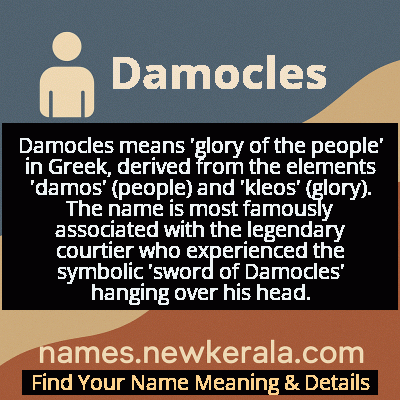Damocles Name Meaning & Details
Origin, Popularity, Numerology Analysis & Name Meaning of Damocles
Discover the origin, meaning, and cultural significance of the name DAMOCLES. Delve into its historical roots and explore the lasting impact it has had on communities and traditions.
Name
Damocles
Gender
Male
Origin
Greek
Lucky Number
9
Meaning of the Name - Damocles
Damocles means 'glory of the people' in Greek, derived from the elements 'damos' (people) and 'kleos' (glory). The name is most famously associated with the legendary courtier who experienced the symbolic 'sword of Damocles' hanging over his head.
Damocles - Complete Numerology Analysis
Your Numerology Number
Based on Pythagorean Numerology System
Ruling Planet
Mars
Positive Nature
Generous, passionate, energetic, and humanitarian.
Negative Traits
Impulsive, impatient, moody, and can be overly emotional.
Lucky Colours
Red, maroon, scarlet.
Lucky Days
Tuesday.
Lucky Stones
Red coral, garnet.
Harmony Numbers
1, 2, 3, 6.
Best Suited Professions
Military, sports, philanthropy, leadership roles.
What People Like About You
Courage, energy, leadership, generosity.
Famous People Named Damocles
Damocles of Syracuse
Courtier
Central figure in the Sword of Damocles legend demonstrating the perils of power
Damocles Lorrain
Historian
19th century scholar specializing in European aristocratic history
Damocles Papadopoulos
Poet
Modern Greek poet exploring themes of power and responsibility
Name Variations & International Equivalents
Click on blue names to explore their detailed meanings. Gray names with will be available soon.
Cultural & Historical Significance
The story has become one of Western civilization's most enduring parables about leadership, appearing in literature, philosophy, and political discourse for over two millennia. It serves as a cautionary tale about the hidden burdens of authority and has influenced political thought from Roman times through the Renaissance to modern political theory. The concept has been referenced by Shakespeare, used in Renaissance art, and employed in modern political rhetoric to describe the precarious nature of high office. The enduring power of this metaphor ensures that the name Damocles continues to carry deep cultural resonance beyond its original mythological context.
Extended Personality Analysis
Individuals named Damocles are often perceived as ambitious and charismatic, with a natural inclination toward leadership roles. They tend to be highly aware of social dynamics and possess a keen understanding of power structures, though this awareness can sometimes manifest as anxiety about their position or status. The mythological association gives the name a weighty quality, suggesting someone who understands that great rewards often come with significant risks and responsibilities. These individuals may exhibit a philosophical depth, frequently contemplating the balance between privilege and peril in their own lives and careers.
People with this name often demonstrate resilience under pressure and the ability to maintain composure in challenging situations, though they might struggle with the psychological burden of constant vigilance that the name's legendary association implies. They tend to be strategic thinkers who consider long-term consequences and understand that visible success often masks hidden vulnerabilities. The name suggests a person who carries themselves with dignity and awareness, possibly developing a somewhat fatalistic or deeply philosophical outlook on life as they navigate the complexities of achievement and responsibility.
Modern Usage & Popularity
In contemporary times, Damocles remains an uncommon but culturally resonant name, primarily used by parents seeking a distinctive classical name with profound philosophical implications. Its usage peaked modestly in the 1990s during a revival of mythological names but remains rare, typically appearing fewer than 50 times annually in English-speaking countries. The name is most popular among academic families, classical scholars, and those with Greek heritage who appreciate its historical weight. Modern usage often reflects parents' desire to instill an understanding of responsibility and the complex nature of success in their children. While not trending upward significantly, it maintains a steady presence as a sophisticated alternative to more common classical names like Alexander or Darius, chosen by parents who want a name that carries both historical significance and philosophical depth.
Symbolic & Spiritual Meanings
The name Damocles has evolved into a powerful symbol representing the inherent dangers and anxieties that accompany power, wealth, and high position. It embodies the concept that great privilege often comes with equally great vulnerability and constant threat. The 'sword' metaphor has been widely adopted in psychology to describe the phenomenon of 'Damocles syndrome' - the persistent anxiety experienced by those in high-stakes positions or facing constant danger. In literature and political discourse, it symbolizes the precarious nature of authority and the psychological burden of leadership. The name also represents the philosophical insight that true happiness cannot exist under constant threat, serving as a reminder that external success often masks internal turmoil and vulnerability. This symbolic meaning has made Damocles a enduring reference point in discussions about the costs of achievement and the hidden pressures of prominent positions.

